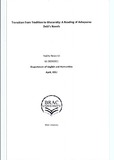| dc.contributor.advisor | Islam, Syad Manzoorul | |
| dc.contributor.author | Nowshin, Audity | |
| dc.date.accessioned | 2012-07-15T06:30:07Z | |
| dc.date.available | 2012-07-15T06:30:07Z | |
| dc.date.copyright | 2012 | |
| dc.date.issued | 2012-04 | |
| dc.identifier.other | ID 08303001 | |
| dc.identifier.uri | http://hdl.handle.net/10361/1920 | |
| dc.description | This thesis is submitted in partial fulfillment of the requirements for the degree of Bachelor of Arts in English, 2012. | en_US |
| dc.description | Cataloged from PDF version of thesis. | |
| dc.description | Includes bibliographical references (page 34-35). | |
| dc.description.abstract | At the end of the 19th century and the beginning of the 20th century, the colonial Bengal
experienced a contradictory and radical change in terms of society, politics and family life. These changes influenced every sphere of life particularly women sphere. The self-exploration of women and the development of women's condition were always thought as the negative and wasted part of human life . As a result, women have always struggled against or with the family as well as with the society to find out a space for their own. About hundred a year back a woman had always treated as the tool of the house whose only responsibilities are in home making, child bearing and taking care of her husband. The rigid family traditions and values, more specifically the Hindu elite Brahmin, restricted the women from seeing the outer world or getting engaged with it. Time and tradition have defined a woman's space within the household.
Ashapurna Debi's intergenerational novels The First Promise (1964) and Subarnalata (1966) depictthe women's condition and struggle in the 20th century. These novels also focus their effort on the transition from tradition to modernity as well as the female consciousness of a particular time and space . In Satyabati's life reader gets the sense of modernization, whereas through Subarnalata reader gets the consequences of the modernization process ; a transition from being colonized to become an independent state of the world- India This thesis aims to xamine the process of change to show how women within her own space struggled to produce an environment of liberty and freedom. In the process , both narration and the critical examination of the novels will be carried out to present women's struggle of the time that approached to come out from the cage. | en_US |
| dc.description.statementofresponsibility | Audity Nowshin | |
| dc.format.extent | 40 pages | |
| dc.language.iso | en | en_US |
| dc.publisher | BRAC University | en_US |
| dc.rights | BRAC University thesis are protected by copyright. They may be viewed from this source for any purpose, but reproduction or distribution in any format is prohibited without written permission. | |
| dc.subject | English and humanities | |
| dc.title | Transition from tradition to modernity: a reading of Ashapurna Debi's novels | en_US |
| dc.type | Thesis | en_US |
| dc.contributor.department | Department of English and Humanities, BRAC University | |
| dc.description.degree | B.A. in English | |

